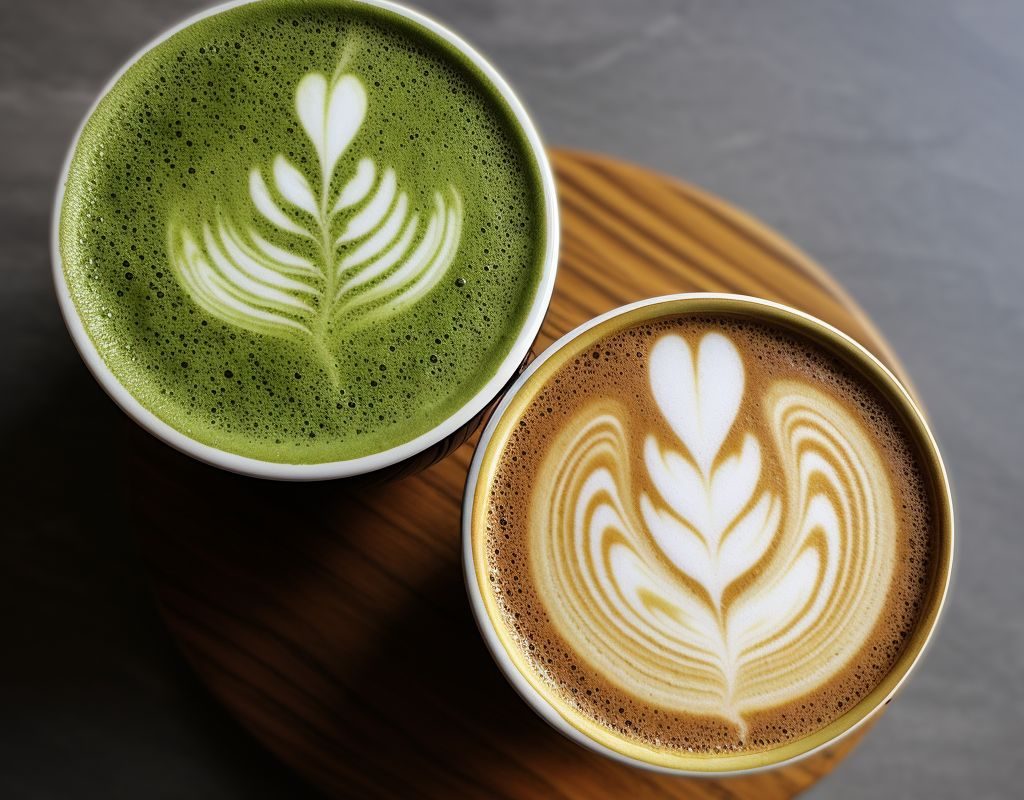In the daily hustle of life, the morning ritual of sipping a hot beverage is a sacred time for many of us. For decades, coffee has been the most popular choice for a quick energy boost, but in recent years, matcha—a traditional Japanese green tea powder — has emerged as a popular alternative. Both drinks have loyal followers and are valued for their unique flavors and health benefits, but how do they really stack up against each other? Let’s explore the differences between matcha and coffee, from their caffeine kicks to their cultural significance.
Coffee Or Matcha: Which Is Better For You?
Caffeine Content and Energy:
One of the most critical factors for many morning brew aficionados is the caffeine content. Coffee generally contains between 95-165 mg of caffeine per 8-ounce cup, depending on the variety and preparation. Matcha, on the other hand, offers a different kind of buzz. A standard serving contains about 70 mg of caffeine, but it’s the synergy between caffeine and L-theanine, an amino acid found in green tea, that sets it apart. This combination delivers a more sustained release of energy without the jitters or crash often associated with coffee.
Health Benefits:
Both beverages pack a punch when it comes to health benefits, but their profiles are quite distinct. Coffee is rich in antioxidants like chlorogenic acids, which can help reduce inflammation and improve heart health. It’s also been linked to a lower risk of diseases such as Alzheimer’s and Parkinson’s.
Matcha is a powerhouse in its own right. It’s exceptionally high in catechins, a type of antioxidant that is much more potent than those found in regular green tea. Matcha’s star component, EGCG (epigallocatechin gallate), is renowned for its cancer-fighting properties and its ability to boost metabolism. Furthermore, the presence of L-theanine enhances mental clarity and relaxation.
Environmental Impact:
The environmental impact of both coffee and matcha is significant, but in different ways. Coffee cultivation is often associated with deforestation and pesticide use, which can have detrimental effects on ecosystems and biodiversity. Sustainable coffee farming practices are becoming more prevalent but are not yet widespread.
Matcha cultivation, particularly in Japan, is generally more sustainable. The tea bushes are grown in shaded conditions that reduce the need for chemical inputs and improve the quality of the leaves. However, as global demand for matcha increases, sustainable practices will be vital to maintaining its environmental integrity.
Cultural and Economic Impact:
Coffee has a stronghold in Western culture, particularly in the U.S. and Europe, where coffee shops are social hubs and workspaces. It has a significant economic impact, supporting millions of jobs worldwide, from farmers to baristas.
Matcha, while traditional in Japan, has gained international popularity, influencing not only beverage choices but also culinary trends. As matcha becomes more mainstream, it is also starting to have a more notable economic impact, particularly in the U.S. and other Western markets where specialty tea shops and café offerings are expanding.
In the end, choosing between matcha and coffee might come down to personal preference or specific health goals. Coffee offers a robust flavor and an immediate caffeine boost, making it ideal for those needing a quick start. Matcha, with its complex taste and health-boosting properties, provides a more balanced energy lift and a host of antioxidants. Whether you’re a devout coffee lover or a matcha enthusiast, both beverages offer unique benefits and pleasures. As we become more conscious consumers, the choice between matcha and coffee will increasingly reflect considerations of health, culture, and environmental impact.
Cheers to your matcha journey! ?
✨Let’s Dive Deeper into the World of Matcha?✨
Download my FREE Guide to Understanding Different Matcha Powder Grades today and learn how to select the best quality matcha powder for your needs!
Also, discover my other blog posts about Matcha for more facsinating insights, practical tips and recipes:
- Matcha Tea: Great Ways to Enjoy Matcha (VIDEO GUIDE INCLUDED)
- Matcha Tea: A Guide to Understanding Different Grades (VIDEO GUIDE INCLUDED)
- Best Places to Enjoy Matcha Drinks and Desserts in Zurich (LOTS OF PHOTOS INCLUDED)
- Matcha Tea: Five Matcha Preparation Tips for Beginners (VIDEO GUIDE INCLUDED)
- Health Benefits of Matcha. Can Matcha Help with Depression?
- Matcha Tea: A Brief History of Matcha
- An Introduction to Matcha Green Tea
Let’s Stay Connected ???
Follow me on TikTok and YouTube for more more insights and matcha related content.




Since I’m not a big coffee fan, I’m going to try matcha! Thanks for the great information!☺️
Great idea! Check my article on the best matcha spots in Zurich! ☺️
Fantastic comparison between matcha and coffee! ?
Your analysis of their health, environmental, and cultural impacts was incredibly enlightening. This reinforces my choice to stick with green tea or tea in general every morning instead of coffee! ?
I am totally with you! Thank you for the feedback Alex! ☺️